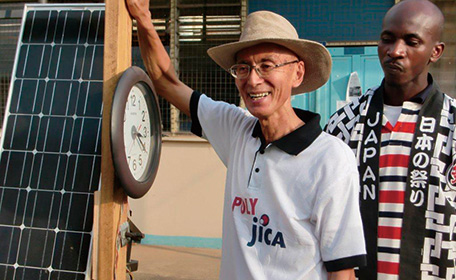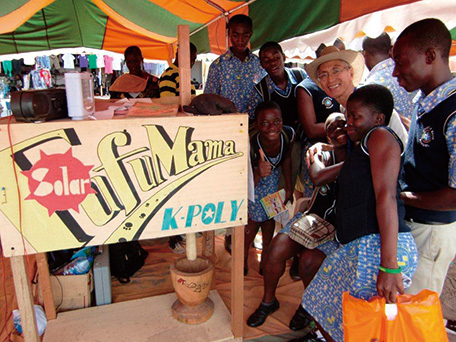Japan's Official Development Assistance White Paper 2012
Stories from the field 9
Solar Power Runs on Original Technology
– Senior Volunteer Finds Niche in Ghana –

Mr. Maruko with the automatic sun-tracking panel "Solar King" (Photo: Masayoshi Maruko)
It is March 2012, and a crowd is gathering around the booth of the Kumasi Polytechnic (K-Poly) at the Ghana International Trade Fair held in Accra, capital of the western African nation of Ghana. Among over 70 Ghanaian institutes, colleges and universities, K-Poly is the first to participate in this trade fair at which all kinds of products from all over the world are exhibited. Their showpiece is called "Fufu Mama," and it is a machine that uses solar power to pound fufu, a Ghanaian staple food made from yams and pounded into a substance not unlike Japanese mochi.
Masayoshi Maruko looks with a smile on university personnel passionately promoting their products. Mr. Maruko teaches practical electronic engineering to lecturers and students as a senior volunteer for JICA. "We showcased solar power generation, so we exhibited from under a tent that was so broiling hot that a thermometer would burst," he said. "Nonetheless, my lecturer colleagues endured the 19-day event without so much as one complaint. I pushed for participation in the exhibition in part to stir up enthusiasm in the students toward a specific objective. I must admit to pushing ahead with this plan, and that caused considerable confusion on the school's part. However, deans and heads of department visited the tent frequently and dealt proactively with the media."
Improvements to the power supply network in rural Ghana have stalled. Small communities are scattered about in the three particularly poor districts in the northern part of the country; it is fairly expensive to set up a power grid in such places and only 35% of the people who live there are able to use the power. However, those three districts receive much sunlight, so there are growing hopes for the generation of solar power, which does not depend on the grid.

High school students observing the Fufu Mama at The Ghana International Trade Fair (Photo: Masayoshi Maruko)
Mr. Maruko runs a car audio store in Towada City, Aomori Prefecture. He specializes not only in car audio but also in the repair of all types of electronic products. He signed up to become a JICA Senior Volunteer at the urging of a JICA volunteer friend of his, who told Mr. Maruko that his skills and knowledge in electronics engineering could be of help without doubt. Mr. Maruko saw the burning sunlight in Ghana as a power source and said, "Most developing countries are located near the equator. The ultimate clean energy is plentiful in Ghana as well, and it could become a major exporter in the future."
Unfortunately, since Ghana lacks technicians with electronic engineering knowledge, problems with solar power generation machinery would have to be handled the same way as those with common electronics: with replacement rather than repair. Mr. Maruko works at K-Poly in Kumasi, the second-largest city in Ghana, and offers practical guidance on the manufacture and repair of electronics with the aim of familiarizing people with solar power generation. He worked with students to build the Fufu Mama as a specific way to use solar power and is also exhibiting at this trade show an electric sewing machine called "Solar Tailor" and LED lighting to be used at night instead of candles.
Just one 55-watt solar panel is enough to power the Fufu Mama, and the machine wastes no power as it pounds the yams because it operates on direct current (DC). To use solar power in conjunction with household power sources, stored DC is converted to alternating current (AC), but this conversion requires an expensive converter and results in a loss of power. Generally, most electronic devices operate from DC power supplies converted inside of themselves. Mr. Maruko's method uses stored DC as it is, and the theory behind his method likely originated from his experience in dealing with all kinds of repairs in a countryside city in Japan.
Mr. Maruko and his students are currently developing an automatic sun-tracking panel called "Solar King" with the aim of total generation efficiency. This panel tracks the sun at hourly intervals, rests itself at night and begins operating again each morning. Mr. Maruko offers guidance toward helping Ghana develop its own originality because he wants it to develop its own methodology, not just keep pace with developed countries. He wants to make sure that the people of Ghana treasure that originality: "I want the people of Ghana not to focus on what is right in front of them but to embark on a new, long history on the strength of their own observations and skills. I think we are drawing near an age where each country will determine its own needs instead of longing for what other countries have."
